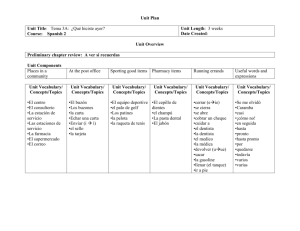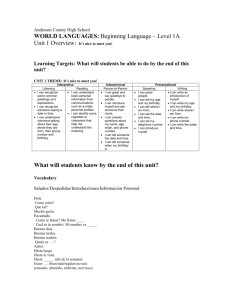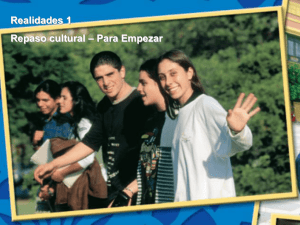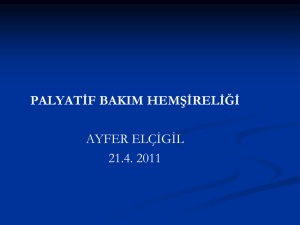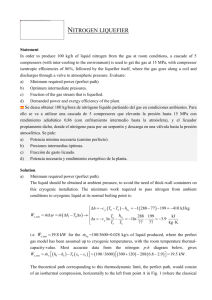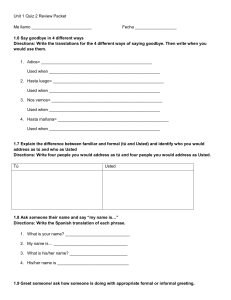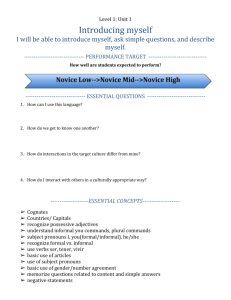Jaati Hasta - Nrityanjali Academy of Dance
advertisement
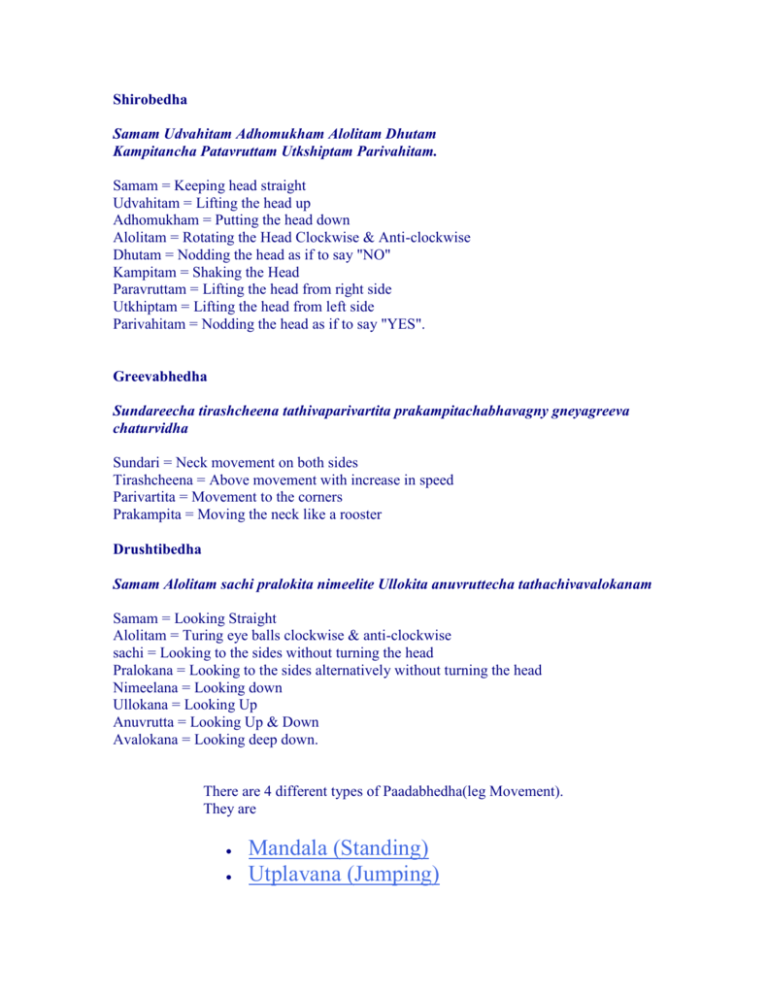
Shirobedha Samam Udvahitam Adhomukham Alolitam Dhutam Kampitancha Patavruttam Utkshiptam Parivahitam. Samam = Keeping head straight Udvahitam = Lifting the head up Adhomukham = Putting the head down Alolitam = Rotating the Head Clockwise & Anti-clockwise Dhutam = Nodding the head as if to say "NO" Kampitam = Shaking the Head Paravruttam = Lifting the head from right side Utkhiptam = Lifting the head from left side Parivahitam = Nodding the head as if to say "YES". Greevabhedha Sundareecha tirashcheena tathivaparivartita prakampitachabhavagny gneyagreeva chaturvidha Sundari = Neck movement on both sides Tirashcheena = Above movement with increase in speed Parivartita = Movement to the corners Prakampita = Moving the neck like a rooster Drushtibedha Samam Alolitam sachi pralokita nimeelite Ullokita anuvruttecha tathachivavalokanam Samam = Looking Straight Alolitam = Turing eye balls clockwise & anti-clockwise sachi = Looking to the sides without turning the head Pralokana = Looking to the sides alternatively without turning the head Nimeelana = Looking down Ullokana = Looking Up Anuvrutta = Looking Up & Down Avalokana = Looking deep down. There are 4 different types of Paadabhedha(leg Movement). They are Mandala (Standing) Utplavana (Jumping) Bhramari (Circling) Paadachari (Walking) Mandala There are 10 categories in Mandala. They are Sthanaka - Stand Straight with Ardhachandra Hasta on the waist Aayata - Keep 12 inch distance between the feet and bending the knees a little. Aaleedha - Keep the right foot 3 feet in front of the left foot, holding shikhara hasta in the left and katakamukha hasta in right hand Prenkhana - Stand with one foot on the knee of the other and holding koorma hasta Prerita - Hit the floor hard with one leg, bend the knees, keep the other foot a little futher, hold shikhara in one hand, near the chest and pataka in another, stretched away Pratyaleedha - Opposite of Aaleedha Swastika - Keep right leg across the left leg and right hand across the left hand Motita - Sit on toes, touch the ground with knees, altenatively Samasoochi - Toch the ground with toes & knees Paarshwasoochi - Sit on toes, touch the ground with one of the knees in one side Sthanaka Mandala is further classified as Samapaada - Stand Straight. While worshipping the god this is used. Ekapaada - Stand with one foot on the knee of the other. To show a Saint in Penance this is used. Naagabandha - Twist one leg with the other & one hand with the other. To show a pair of snakes this is used. Aindra - Bend one of the legs little and lift the knee of the other and keep the hands as usual. To show Indra this is used. Garuda - Bend the left leg keeping the foot completely on the floor, bend the right leg and sit on the right leg. This is used to show the bird Garuda, Lord Vishnu's Vehicle. Brahma - Sit down, cross the feet like Padmasana. This is used to show meditation. Utplavana There are 5 types of Utplavana. They are Alaga - Hold Shikhara hasta on the waist and jump Kartaree - Hop on the toes, hold Kartareemukha hasta behind the left leg and hold shikhara hasta, upside down on the waist Ashvotplavana - Hop forward on one leg and bring the other leg together,hold tripataka hasta in both the hands Motita - Hold tripataka hasta in both the hands, jump like Kartaree Utplavana on both side Krupaalaga - Jump in such a way that the heel touches the back side Bhramari There are 7 types of Bhramari. They are Utplutabhramari - With Samapaada Sthanaka, jump & turn around Chakrabhramari - Hold tripataka hasta in both the hands and turn around while dragging the legs on the floor Garudabhramari - Keep one of the knees on the ground, stretch the other leg and turn around Ekapaadabhramari - Stand on one leg and turn around with the other Kunchitabhramari - Jump and turn around folding the legs up Aakaashabhramari - Jump , spread the legs apart and turn around Angabhramari - Keep the legs 12 inch apart and turn the body around Paadachari There are 8 types of Paadachari. They are Chalanachaari - Walk casually Chankramanachaari - Walk while keeping the legs sideways Saranachaari - Walk while dragging one feet and bringing the other together without lifting the heel from the ground Veginichaari - Walk fast while changing alapadma & tripataka hasta alternatively Kuttanachaari - Walk while tapping the feet hard on the floor Lunthitachaari - Stand in Swastikamandala and perform kuttanachaari in the front leg Lolithachaari - Perform kuttanachaari in one leg and walk slowly with the other one Vishamachaari - Walk while the legs are twisted together Gathibhedha There are 10 unique ways of Gathibhedha(Gait). They are Hamseegathi - Walk while keeping one foot in front of the other and sway with each step, hold kapitha hasta in both hands. (Walk like a Swan) Mayooreegathi - Stand on the tip of toes, hold kapitha in both hands and fold up the legs for each step. (Walk like a Peacock) Mrugeegathi - Hold tripataka in both hands and run around like a Deer Gajagathi - Hold pataka hasta near the ears, walk very slowly with Samapaada Turangineegathi - Lift the right leg, hold shikhara in left hand and pataka in right hand and jump with the left leg.(Like a Horse) Simheegathi - Hold shikhara hasta in both hands, jump on the toes ans move forward. (Like a Lion) Bhujangeegathi - Hold tripataka in both hands & walk as explained in simheegathi. (Like a Snake) Mandookeegathi - Like simheegathi. Veeragathi - Hold shikhara hasta in left hand, pataka in right and walk as though comming from far. Maanaveegathi - Keep the left hand on the waist, katakamukha in right and walk while turning around for each step. Hasta HASTA PRANALAKSHANA The way a hasta/mudra is held, is divided into 12 Pranalakshana ie 12 different ways of holding a hand. Prasarana Hasta - The fingers are stretched Kunchita Hasta - The fingers are folded Rechita Hasta - The fingers are given movement Punchita Hasta - The fingers are folded or moved or stretched Apaveshtita Hasta - The fingers are bent down Prerita Hasta - The fingers are bent back or moved or stretched Udveshtita Hasta - Holding the hands UP while dancing Vyavrutta Hasta - Hands help UP in the sides Parivrutta Hasta - Hands are brought together from sides (like a namaskara) Sanketa Hasta - Hands used to convey Implied Meanings Chinha Hasta - While dancing a dancer tries to show lot of things which are visible & invisible like a person's physical appearence, face, weapons, places of limbs & other parts of the body, his/her influence on others, their mannerisms etc. Hands used to show such things are called Chinhe Padarthateeke - Hands used to confirm the meanings of certain words The hand gestures are divided as Asamyuta Hasta - Single hand gestures Samyuta Hasta - Double hand gestures There are 28 asamyuta hastas & 24 Samyuta hastas. Each hasta has a defined usage called Viniyoga. These viniyogas are again sanskrit shlokas written in Natyashastra. Asamyuta Hasta Pataka tripatakordhapataka kartareemukhaha Mayurakyordhachandrashcha arala shukatundakaha Mushtishta shikarakyashcha kapitha katakamukhaha Suchee chandrakala padmakosham sarpashirastata Mrugasheersha simhamukho langulasolapadmakaha Chaturo bramarashchiva hamsasyo hamsapakshakaha Samdamsho mukulashchiva tamrachooda trishoolakaha Ashtavimshatihastanaam evam naamaanivikramat. Samyuta Hasta Anjalishcha kapotashcha karkata swastikastatha Dolahasta pushpaputaha Utsanga shivalingakaha Katakavardhanashchiva kartaree swatikastata Shakata shankha chakrecha samputa pasha keelakau Matsya Koorma Varahashcha Garudonagabandakaha Khatwa bherundakakhyashcha avahitastathivacha Chaturvimshatisankhyakaha samyuta katithakaraha The Viniyoga (usage) of these are described below. Hasta Viniyogas Asamyuta Hasta Samyuta Hasta Asamyuta Hastas Pataka Hasta Stretch all the fingers & hold them tightly together to show Pataka Hasta. Nattyaarambhe Vaarivaahe Vane Vastunishadhane to begin the dance, clouds, forest, to refuse something Kuchasthale Nishanyaamcha Nadhyaam Amaramandale to show brests, night sky, river, the heavens Turage Khandane Vaayau Shayane Gamanodyame horse, strike down, wind, sleeping, to go quietly Prataapecha Prasaadecha Chandrikaayam Ghanaatape to indicate greatness, to offer something, moonlight, bright sunlight Kavaattapaattane Saptavibhaktyarthe Tarangake to open a door, seven scriptures, waves Vithipraveshabhaavepi Samatvecha Angaraagake to enter a street, to show equality, to anoint ones body Aatmaarthe Shapathechaapi Tushnimbhaavanidarshane to show oneself, to take an oath, to show silence Aashirvaadakriyaayaamcha Nripashreshtasyabhaavane to bless,ideal king, Taalapatrecha Khettecha Dravyaadisparshane tatha palm leaf, shield, to touch things Tatratatretivachane Sindhautu Sukrutikrame to indicate such and such person, ocean, to indicate everything is alright Sambhodhane Purogepi Khadgarupasyadharane to address a person, going forward, sword Maase Samvatsare Varshaadine Samaarjane tatha month, year, rainy season, to sweep Evamartheshuyujyante Pataakahastabhavanah these are the different usages of Pataka Hasta Tripataka Hasta Bend the fourth finger & hold the rest tightly, like in pataka hasta to show Tripataka Hasta. Makute Vrukshabhavecha Vajre Taddharavasave Crown, Tree, Weapon of Lord Indra, Lord Indra Ketakee kusume Deepe Vanhijwalavigrumbhane Ketakee Flower, Lamp, to show flames Kapole Patralekhayaam Baanarthe Parivartane Cheeks, Letter writing, Arrow, Changing Streepumpsayosamayoge Yujyate Tripatakakaha Getting together of Man & Woman Tripataka is used. Ardhapataka Hasta Bend the fourth & the last finger and hold the rest tightly like in Tripataka Hasta to show Ardhapataka Hasta. Pallave Phalake Teere Ubhayoritivachake Sprouts, Board, Banks of rivers, to show two persons Krukache Churikayancha Dhwaje Gopura Shrungayoho Hack Saw, Sword, Flag, Shrine, Horns Yujyaterdhapatakoyam Tatatkarmaprayogataha Ardhapataka is used to show all these things. Kartareemukha Hasta Hold Ardhapataka Hasta. Then make an angle between the second & third fingers (like in scissors) to show Kartareemukha Hasta. Streepumsayostuvishleshe Viparyasapadepicha Seperation of Man & Woman,differentiation Lunthane Nayanantecha Marane Bhedabhavane Stealing, Glance, Death, Showing Difference Vidyudarthe Ekashayya Virahe Patanetatha Lightning, Single Bed, Pain of Seperation, Falling Down Latayaam Yujyatechayam Kartareemukha Isyate Creeper Kartareemukha is used for all these things. Mayura Hasta Hold Tripataka Hasta but touch the fourth finger with the thumb to show Mayura Hasta. Mayurasye Latayancha Shakune Vamanetatha Peacock, Creeper, Bird, Vomitting Alakasyapanayane Lalate Tilakeshucha Curls, Forehead, Dot on the Forehead(bindi) Netrasyodakavikshepe Shastravade Prasidhake Tears, Predictions, Famous Yevamartyeshu Yujyante Mayurakarabhavanaaha To show all these meanings Mayura Hasta is used. Ardhachandra Hasta Leave the thumb in the Pataka Hasta to show Ardhachandra Hasta. Chandre Krishnashtameebhaje Galahastadikepicha Moon, Krishna's Birthday, pushing out holding the neck Bhallayudhe Devatanaamabhishechanakarmanee Weapon, worshipping the gods Bhukpatrecha Udbhave Katyaam Chintayaam Aatmavachake Plate, Creation, Waist, Worrying, Saying that "It is mine" Dhyanecha Prarthanechapi Angasamsparshane tatha Meditation, Praying, Touching the Limbs Prakrutanaamnamaskarepyardhacahndroniyujyate To salute the common man Ardhachandra Hasta is used. Arala Hasta Fold the second finger in Pataka Hasta to show Arala Hasta. Vishamrutadipaneshu Prachandapavanepicha Drinking Poison or Nectar, Thunder storm Yujyateraalahastoyam bharattagamakovidhihi Arala Hasta is used to show all these things. Shukatunda Hasta Bend the fourth finger in Arala Hasta to show Shukatunda Hasta. Baanaprayoge Kuntarthe Marmoktaaugrabhavane To Shoot an Arrow, Weapon, Saying Cunning things, Showing Fury Shukatundakarogneyo Bharatagamavedhibhihi Shukatunda Hasta is used for all these things. Mushti Hasta Fold all the fingers in to the palm & keep the thumb on them to show Mushti Hasta(like a fist). Sthire Kachagrahe Dardhye Vastraadeenaanchadharane Strength, Dragging by the Hair, Courageous, Holding Things Mallanaam Yudha bhavecha Mushtihastoyamuchyate Wrestling To show all these Mushti Hasta is used. Shikhara Hasta Stretch the thumb finger in Mushti Hasta to show Shikhara Hasta. Madane Karmukhe Sthambe Nishabdhe Pitrutarpane Cupid, Bow, Piller, Silence, Offerings to the dead ancestors Oshte Pravishtaroopecha Radane Prashnabhavane Lips, Enterung, Teeth, Questioning Ange Naasteetivachane Smarane Abinayaantare Limbs, saying 'NO', Recollection, At he end of an expression Katibandhakarshanecha Parirambhavidhoudhave Tieing around the waist, Hugging Shaktitomarayormokshe Ghantanadecha Peshane Weapon names Shakti, Weapon called Tomara, Ringing the Bell, Churning Shikharo Yujyatesoyam Bharatagamavedhibhihi Shikhara Hasta is used to show all these things. Kapitha Hasta Fold the second finger on the thumb in the Shikhara Hasta to show Kapitha Hasta. Lakshmyamchiva Saraswatyam Veshtane Taladharane To show Godess Lakshmi, Saraswati, Going Around, Holding the symbols(Tala) Godohanechanjanecha Leelattasumadharane Milking the cows, Putting eye liners, Holding Flowers Chelanchaladigrahane Patasyivavakuntane Holding the Saree(pallu), Draping a cloth on the face Dhoopadeepaarchanechapi Kapithasamprayujyate To Hold Lamp and Incense, Kapitha Hasta is Used. Katakamukha Hasta Bring together the thumb, index & middle fingers & stretch the other two fingers at an angle to show Katakamukha Hasta. Kusumapachaye Muktasrajaam Daamnancha Dharane Plucking the flowers, Pearl necklace, Wearing Flowers Sharamandaakarshanecha Nagavallee Pradanake Getting attracted by the cupid arrows, Giving Beetle Leaf Kastoorikadi Vastoonaam peshane Gandhavasane Showing Kastoori & other Perfumes, Enjoying the perfumes, Vachane Drushtibhavecha Katakamukha Ishyate To show Talking & Seeing Katakamukha Hasta is used. Suchi Hasta Stretch the index finger & bring together all others to show Suchi Hasta. Ekarthepi Parabrahmabhavanayam Shatapicha Showing Number One, Showing Para Brahma, To show 100 Ravou Nagaryam Lokarthe Tathepivachanepicha Sun, City, Univerce, Saying 'That's how it is' Yachabdepichatatchabdhe Vyajanarthepitarjane Asking 'when, why, who, how?', Scaring Karshye Shalakavapushe Ashcharye Venibhavane Thin or Skinny, Wonder, Showing the hair Chatre Samarthe Konecha Romalyam Bheribhedhane Umbrella, Capable, Room, Exitement, Beating an instrument called Bheri Kulalachakrabhramane Rathange Mandaletatha Showing potter's Wheel, Wheel of a chariot, Group of People Vivechane Dinantecha Suchi Hasta Prakeertithaha Thinking, Evening all these are shown using Suchi Hasta. Chandrakala Hasta Stretch the thumb finger in Suchi Hasta to show Chandrakala Hasta. Yesha Chandrakalaa chandrakallayame Vyujyate This Chandrakala Hasta is used to show Moon. Padmakosha Hasta Bend all the fingers towards the palm to show Padmakosha Hasta. Phale Bilwa Kapithadou Streenaamcha Kuchakumbhayoho To show Fruits like Bilwa & Kapitha, Breasts Vartule Kanduke Swalpabhojane Pushpakoshake Round, Ball, Small qualtity of food, Bud Sahakaraphale Pushpavarshe Manjarikadishu Mango, Rain of flowers, Bunch of Flowers Japakusumabhavepi Ghantaroopa Vidhanake To show Flowers, Bell Valmeeke Kumude Ande Padmakoshobhidheeyate Anthill, Lilly, Egg Padmakosha Hasta is used. Sarpasheersha Hasta Bend the fingers a little in Pataka Hasta to show Sarpasheersha Hasta. Chandane Bhujage Mande Prokshane Poshanadishu Sandalwood paste,Snake, Slow, Sprinkling, Caring Devarshudakadaaneshu Hyaspale Gajakumbhayoho Holy water, Elephant's Forehead Bhujaasphaletu Mallanaam Yujyate Sarpasheershakaha To show the muscles of wreslers Sarpasheersha hasta is used. Mrugasheersha Hasta Stretch the thumb & the little fingers in Sarpasheersha Hasta to show Mrugasheersha Hasta. Streenamarthe Kapolecha Krama Maryadayorapi To show Women, Cheeks, Way of doing things, To show respect Bheete Vivade Nepathye Aavasecha Tripundrake Scare, Argument, Back Stage, The place of living, Forehead Mukhamukhe Rangavalyom Paadasamvahanepicha Meeting of people, Sacred Design on the floor, Massaging the feet Sarvasammelanekaarye Mandire Chatradharane Getting peoplr together, house, Hoding an umbrella Sopane Padavinyase Priyahvane Tathivacha Stairs, Gaite, To call the loved one Sancharecha Prayujyeta Bharatagamakovidhihi To show Movement this hasta is used. Simhamukha Hasta Touch the middle & the ring finger with thumb & stretch the second & little fingers to show Simhamukha Hasta. Vidrume Mouktikechiva Sugandhe Alakasparshane to show Coral, Pearl, Fragrance, Curls Aakarnanecha Prushati Moksharthe Hrudisamstitaha Hearing, Point, Salvation, Heart Home Shashe Gaje Darbhachalane Padmadamini Sacred fire, Rabbit, Elephant, Sacred Grass, Flower Simhanane Vaidyapakashodhane Simhavakrakaha Lion's face, Examin the medicinal preparations Simhamukha Hasta is used. Langoola Hasta or Kangoola Hasta Fold the ring finger in Padmakosha Hasta to show Langoola Hasta. Lakuchasya Phale Balakuche Kalharake tatha To show Lemon, Breasts of a teenager, Flower called Kalhara Chakore Kramuke Baalakinkinyam Ghutikadike A bird called Chakora, Beetle nut, Jingles, Tablets Chaatake Yujyatechayam Kangoolakaranaamakaha A bird called Chataka Kangoola Hasta is used. Alapadma Hasta Stretch & hold all the fingers at an angle to each other to show Alapadma Hasta. Vikachabje Kapithadiphale Chaavartake Kuche Lotus, Fruit Called Kapitha, Turning, Breasts Virahe Mukure Poornachandre Soundaryabhajane Pain of seperation, Mirror, Full moon, Beautiful things Dhammille Chandrashalayaam Grame Uddhata Kopayoho Knotted Hair, Moon Chamber, Village, Height, Anger Tataake Shakate Chakravake Kalakalaarave Lake, Cart, Bird Called Chakravaka, Sound of Birds, wind, water Shlaghane Solapadmashcha Keertito Bharatagame To Praise Alapadma Hasta is used. Chatura Hasta Stretch all the fingers, hold the little finger at an angle to the other fingers & fold the thumb & touch the bottom of the ring finger to show Chatura Hasta. Kastooryaam Kinchidapyarthe Swarnataamraadilohake Fragrane called Kastoori, To show small quantity, Gold and other metals Aardre Khede Rasaaswade Lochane Varnabhedake Wetness, Sadness, Taste, Eye, Differentiate colors Pramane Sarase Mandagamane Shakaleekrute Promise, Romance, Slow movement, Breaking Aasane Ghruta Tailadou Yujyate Chaturakaraha Seat, Melted Butter, Oil Chatura Hasta is used. Bhramara Hasta Touch the Middle finger with thumb, bend the second finger completely, stretch the last two fingers at an angle to show Bhramara Hasta. Bhramarecha Shuke Yoge Saarase Kokiladishu To show Honey Bee, Parrot, Meditation(Yoga), Birds Called Sarasa & Kokila Bhramaraabidhahastoyam Keertito Bharatagame Bhramara Hasta is used. Hamsasya Hasta Touch the index finger with thumb & hold the other fingers at an angle to show Hamsasya Hasta. Mangalyasootrabandhe Chapyupadeshe Vinishchaye Tying the sacred thread of marriage, Advice, Decission Romanche Mouktikadoucha Chitrasamlekhane tatha Excitement, Pearls & other precious stones, Drawing Damshetu Jalabindoucha Deepavarteeprasarane Fly, Drop of water, Wick of the lamp Nikashe Shodhane Mallikadou Rekhavalekhane Polishing, Searching, Jasmine & other flowers, Drawing a line Malayaamvahane SohambhavanayanchaRoopake Holding garland, To say 'i am Brahma' Naasteetivachanechapi Nikashanamchabhavane Saying 'No', Looking at the polished article Krutakrutyepi Hamsasyaha Eerito Bharatagame Hamsasya Hasta is used to show all these things. Hamsapaksha Hasta Stretch the Little finger in Sarpasheersha Hasta to show Hamsapaksha Hasta. Shatsankhyayaam Setubandhe Nakharakankhanetatha To show number 6, Bridge, Impression of the nails Vidhane Hamsapakshoyam Keertito Bharatagame Way of doing thing Hamsapaksha Hasta is used. Samdamsha Hasta Hold the Padmakosha Hasta, close & open the fingers often to show Samdamsha Hasta. Udaare Balidanecha Vrane Keete Manobhaye To show Generosity, Sacrificial Offering, Wound, Insects, Fear Archane Panchavakravye Samdamshakyobhidheeyate Offering Worship, Number 5 Samdamsha Hasta is used. Mukula Hasta Touch the tips of all the fingers to show Mukula Hasta. Kumude Bhojane Panchabane Mudradidharane To shoa Lilly, Eating, Cupid,Smearing sacred marks on the body Naabhoucha Kadaleepushpe Yujyate Mukulakaraha Belly button, Banana Flower Mukula Hasta is used. Tamrachooda Hasta Hold the Mukula Hasta, seperate the index finger, bend a little to show Tamrachooda Hasta. Kukkutadou Bake Kaake Ushtre Vatsecha Lekhane To show Rooster,A bird called Baka, Crow, Camel, Calf and to show letters Tamrachooda Karakhyasou Keertito Bharatagame Taamrachooda Hasta is used. Trishoola Hasta Fold the thumb & the little finger, stretch the other fingers & hold them together to show Trishoola Hasta. Bilwapatre Tritwayukte Trishoolakara Eeritaha To show a leaf called Bilwa & to show the number 3 Trishoola Hasta is used. Anjali Hasta Hold Pataka in both the hands & join the palms to show Anjali Hasta. Devataguru Vipranaam Namaskarepyanukramaat To salute God, Teacher & the Learned hold the Anjali Hasta Karyasshiromukhorassu Viniyojyonjalikaraha above the head, in front of the face & in front of chest respectively. Kapota Hasta In Anjali Hasta, only the borders of the hands are joined(Palm should not touch one another) to show Kapota Hasta. Pramaana Gurusambhasha Viniyogeekrutishwayam To make promise, Speak to the teacher, To be Polite, To Agree this hasta is used. Karkata Hasta Bring the fingers of both the hands between one another to show Karkata Hasta. Samoohadarshane Tundadarshane Shankhapoorane To show Crowd, Thick articles, Blowing of Shankha Angaanaam Motane Shakhonnamanecha Niyujyate Stretching Limbs, Bending the branches of a tree this hasta is used. Swastika Hasta Hold Pataka Hands & cross the hands at the wrist so that the hands are opposite to each other to shoe Swastika Hasta. Samyogena Swastikakhyo Makararthe Niyujyate This hasta is used to show Aligater Bhayavade Vivadecha Keertane Swastikobhavet To Talk in fear, to Argument and to praise this hasta is used. Dola Hasta Hold Pataka Hasta, stretch the arms & keep the hasta upside down along the hip line to show Dola Hasta. Naatyarambhe Prayoktavya Iti Natyavidovidhuhu This hasta is used in the beginning of a dance. Pushpaputa Hasta Hold Sarpasheersha in both the hands & join them at the wrist to show Pushpaputa Hasta. Neerajanavidhou Baala Phaladigrahane tatha To show Lamp Offering, Children, Accept Fruits Sandhyayaamarghyadanecha Mantrapushpe Niyojayet Offering to the Sun in the evenings, Chant Holy prayers This hasta is used. Utsanga Hasta Hold Mrugasheersha Hasta in boh the hands, cross the hands, touch opposite shoulders to show Utsanga Hasta. Aalinganecha Lajjayaam Angadaadipradarshane To Embrace, To show shyness, To show one's body Baalaanaamshikshanechaayam Utsango Yujyatekaraha To deciplinne children Utsanga hasta is used. Shivalinga Hasta Hold Ardhachandra Hasta in the left hand(palm up), keep shikhara Hasta in right hand & place it on the left hand to show Shivalinga Hasta. Viniyogastutatsyva Shivalingapradarshane This Hasta is used to show Shivalinga (Lord Shiva). Katakavardhana Hasta Hold Katakamukha Hasta in both hands, cross the hands at the wrist to show Katakavardhana Hasta. Pattabhisheke Poojayam Vivahadishu Yujyate To show Coronation, To worship and to show weddings this hasta is used. Kartareeswastika Hasta Hold Kartareemukha Hasta in both the hands & cross the hands at the wrist to show Kartareeswastika Hasta. Shakhaasucha Adri Shikhare Vruksheshucha Niyujyate To show the branches of a tree, tip of Mountains, Trees This hasta is used. Shakata Hasta Leave the thumb & the middle fingers in Bhramara Hasta. Hold like this in both the hands & cross at the wrist to show Shakata Hasta. Another way of showing Shakata Hasta is to cross the Arala Hastas at the wrist. Raakshasaabhinayechaayam Niyukto Bharatadibhihi This hasta is used to show Demons. Shankha Hasta Hold the Left thumb with the last three fingers of the right hand, stretch the other fingers of the left hand, stretch & touch the thumb & index fingers of the right hand with the stretched fingers of the left hand to show Shankha Hasta. Shankhaadishuniyujyoya Mityevam Bharataadayaha This hasta is used to show Conch. Chakra Hasta Hold Ardhachandra hasta in both the hands, place them one above the other like a Plus(+) mark to show Chakra Hasta. Chakrahastassa vigneya chakrarthe viniyujyate This Hasta is used to show Chakra, the weapon of Lord Vishnu. Samputa Hasta Hold Chakra Hasta, fold the thumb & little fingers in both the hands to show Samputa Hasta. Vastvaacchchade Samputecha Samputahkara Eeritaha To cover things and to show the sacred box in which the idols are placed this Samputa Hasta is used. Paasha Hasta Hold Suchi Hasta in both hands, bend the index finger a little & join these fingers like a chain to show Paasha Hasta. Anyonyakalahe Paashe Shynkhalaayaam Niyujyate To show Playful Quarrel, Rope, Chains this hasta is used. Keelaka Hasta Hold Mrugasheersha Hasta in both hands, bend the little finger a little & join these fingers like a chain to show Keelaka Hasta. Snehecha Narmalaapecha Viniyogosya Sammataha To show friendly talk this hasta is used. Matsya Hasta Hold Pataka hasta in both the hands, place them one above the other, stretch the thumb a bit (like fins of fish) to show Matsya Hasta. Etasya Viniyogastu Matsyarthe Sammatobhavet This hasta is used to show Fish. Koorma Hasta Opposite of Chakra Hasta is Koorma Hasta i.e Stretch the thumb & little fingers & fold the other fingers in Chakra Hasta to show Koorma Hasta. Koormahastasyavigneyaha Koormarthe Viniyujyate This Hasta is used to show Turtle, Tortoise Varaha Hasta Hold Mrugasheersha hasta in both hands, place them one above the other to show Varaha Hasta. Etasyaviniyogastu Varaharthe tu Yujyate This Hasta is used to Show Boar (Wild Pig) Garuda Hasta Hold Ardhachandra in both the hands, turn them & hold them with the thumbs to show Garuda Hasta. Garudo Garudarthe cha Yujyate Baratagame This Hasta is used to show a bird called Garuda. Nagabandha Hasta Hold Sarpasheersha in both the hands & cross them at the wrist to show Nagabandha Hasta. Bhujagadampatee Bhaave Nikunchanaamcha darshane To show Snakes, Creeper Chamber Athrvanasya mantreshu Yojyo Bharatakovidhihi Atharvana Veda Shlokas this hasta is used. Khatva Hasta Hold Chatura Hasta in both hands, place the hands one above the other, stretch the index fingers down to show Khatva Hasta. Khatvahastobhavedeshaha Khatvaadishu Niyujyate This Hasta is used to show Bed. Bherundha Hasta Hold Kapitha Hasta & cross them at the wrist to show Bherundha Hasta. Bherundhapakshi Dampatyorbherundhaka Eteeritaha To show a bird couple called Bherundha this hasta is used. Avahittha Hasta Hold Alapadma in both the hands, cross them at the wrist, place them near chest to show Avahitha Hasta. Srungara Natanechiva Leelaa Kandukadharane To show Love, Catching the ball Kucharthe Yujyate Soyamavahitthakaraabhidhaha Breasts Avahittha Hasta is used. Using the above two, one can show lot of other things in dance like Deva Hasta Dashavatara Hasta Navagraha Hasta Jaati Hasta Bandhu Hasta Nritta Hasta Deva Hasta Here are some of the hastas used to show the gods & godesses. Name of the Deity Left Hand Brahma Hasta Chatura Hasta Mrugasheersha Hasta Shambhu Hasta Right Hand Hamsasya Hasta Tripataka Hasta Vishnu Hasta Tripataka Hasta Tripataka Hasta Saraswati Hasta Kapitha Hasta, in line with the shoulder Suchi Hasta Parvati Hasta Ardhachandra Hasta, held downwards Ardhachandra Hasta, held upwads Lakshmi Hasta Kapitha Hasta, in line with shoulder Kapitha Hasta, in line with shoulder Vinayaka Hasta Kapitha Hasta, in front of chest Kapitha Hasta, in front of chest Manmatha Hasta Shikhara Hasta Katakamukha Hasta Shanmukha Hasta Trishoola Hasta Shikhara Hasta Indra Hasta Tripataka Hasta Swastika Hasta Agni Hasta Kangoola Hasta Tripataka Hasta Yama Hasta Paasha Hasta Suchi Hasta Niruti Hasta Khatva Hasta Shakata Hasta Varuna Hasta Shikhara Hasta Pataka Hasta Vaayu Hasta Ardhapataka Hasta Arala Hasta Kubera Hasta Padmakosha Hasta Ardhachandra Hasta Dashavatara Hasta The 10(Dasha) incarnations(Avatara) of Lord Vishnu can be shown like this. Name of the Avatara Left Hand Matsya (Fish) Tripataka Hasta Tripataka Hasta First show the Matsya hasta and then hold tripataka hasta in both the hands, in line with shoulders. Koorma (Tortoise) Tripataka Hasta Tripataka Hasta Show the Koorma hasta and then hold tripataka hasta in both the hands, in line with shoulders. Varaha (Wild Bore) Right Hand Position of the Hands Show the Varaha hasta and then keep both hands on the waist. Narasimha (Half Man & Half Lion) Simhamukha Hasta Tripataka Hasta Hold the hands in front of the chest. Vamana (Dwarf) Mushti Hasta Mushti Hasta, turned down Hold the left hand little below the left sholuder and the right hand little above the waist, like showing the sacred thread. Parashuraama Keep the hand on the waist Ardhapataka Hasta Stretch the right hand above the head at an angle. Raama Shikhara Hasta Kapitha Hasta Hold the left hand above the shoulder level, like holding a bow and stretch down the right hand, like holding an arrow. Balaraama Mushti Hasta Hold the hands in front of the chest. Krishna Mrugasheersha Mrugasheersha Both the hands are Hasta Hasta held near the mouth with mrugasheersha hasta opposite to one another, like holding the Flute Kalki Tripataka Hasta Pataka Hasta Pataka Hasta Hold the hands in front of the chest. Navagraha Hasta Name of the Graha Left Hand Right Hand Surya Alapadma Hasta Kapitha Hasta Chandra Alapadma Hasta Pataka Hasta Mushti Hasta Kuja or Mangala Suchi Hasta or Angaraka Mushti Hasta, held Pataka Hasta Budha horizontally Bruhaspati or Guru Shikhara Hasta Shikhara Hasta, both hands held like showing the showing the sacred thread. Shukra Mushti Hasta Mushti Hasta, held upside down Shani Shikhara Hasta Trishoola Hasta Raahu Sarpasheersha Hasta Suchi Hasta Ketu Suchi Hasta Pataka Hasta Jaati Hasta Name of the Jaati Left Hand Right Hand Rakshasa Hasta Shakata Hasta Shakata Hasta, help near the mouth Brahmana Hasta Shikhara Hasta Shikhara Hasta Kshatriya Hasta Shikhara Hasta, held horizontally Pataka Hasta Vyshya Hasta Hamsasya Hasta Katakamukha Hasta Bandhu Hasta Relationship Left Hand Shikhara Hasta Dampati (Married Couple) Maatru (Mother) Ardhachandra Hasta , held near the stomuch Pitru (Father) Ardhachandra Hasta , held Right Hand Mrugasheersha Hasta Samdamsha Hasta Shikhara Hasta near the stomuch Swashru (Mother-in-law) Hamsasya Hasta, held near the neck Samdamsha Hasta Swashura (Father-in-law) Hamsasya Hasta, held near the neck Shikhara Hasta Bhartru Bhaatru Shikhara Hasta (Brother-in-law) Nanand (Sister- Show the above hasta and then show Mrugasheersha in-law) Hasta in right hand Kartareemukha Hasta Sodara (Brother Mayura Hasta Mayura Hasta Putra (Son) Shikhara Hasta Snusha (Daughter-inlaw) Show the above hasta and then show Mrugasheersha Hasta in right hand Sapatni (Second Wife) Mrugasheersha Hasta Samdamsha Hasta, held near the stomuch First Paasha Hasta and then Mrugasheersha Hasta 13 Hastas are categorised under Nritta Hasta. They are so named because of their usage in Aduvus.There are different ways of holding the Nritta Hastas. They can be held - Facing Upward - Facing Downward - To the Right - To the Left - In Front Depending on the footwork, the nritta hastas should be held in proper places. The 13 Nritta Hastas are Pataka Swastika Dola Anjali Katakavardhana Shakata Paasha Keelaka Kapitha Shikhara Koorma Hamsasya Alapadma
